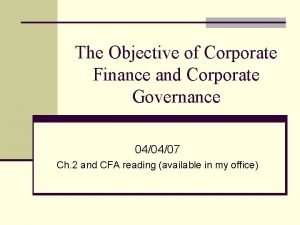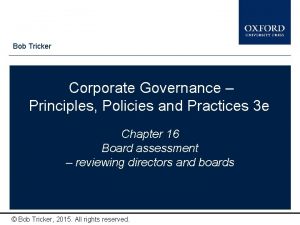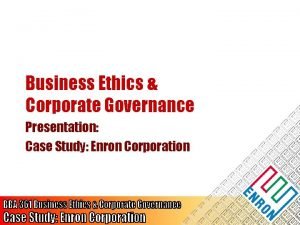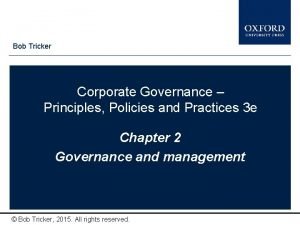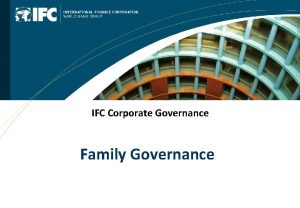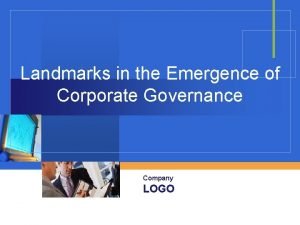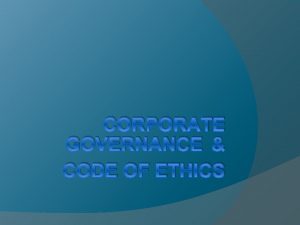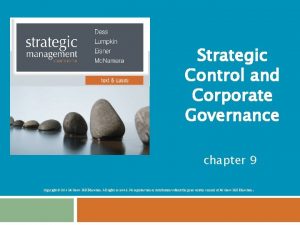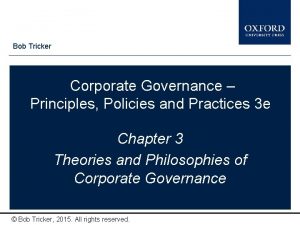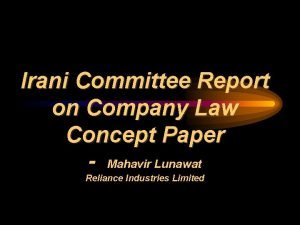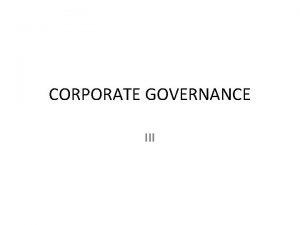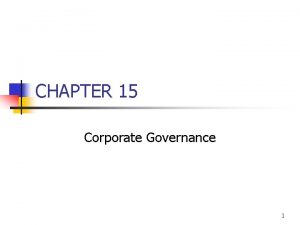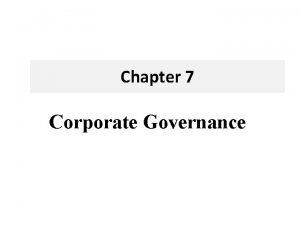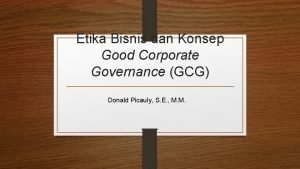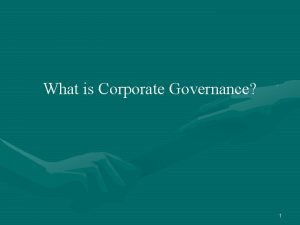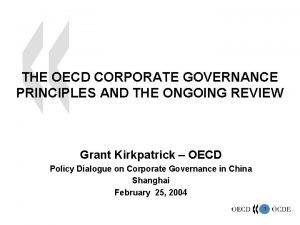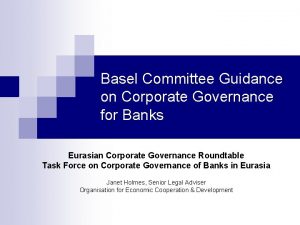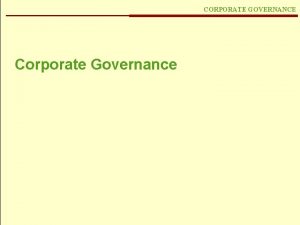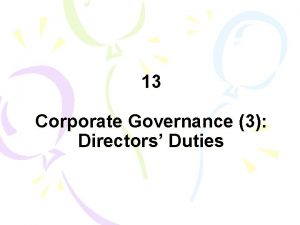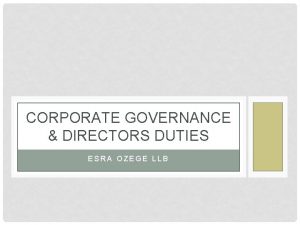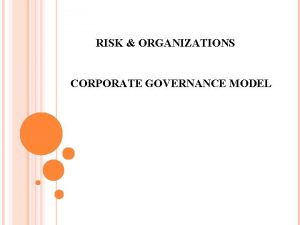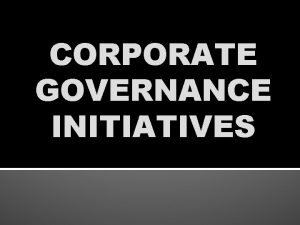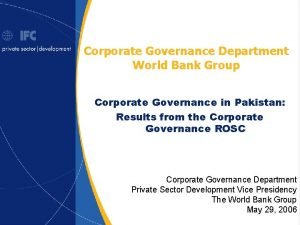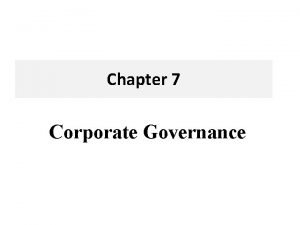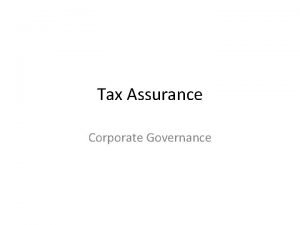12 Corporate Governance 2 Directors Duties Content 1






























- Slides: 30

12 Corporate Governance (2): Directors’ Duties

Content 1. Power of Management 2. Fiduciary Duty 3. UK Law: Duty to Act within Powers 4. UK Law: Duty to Promote the Success of the Company

1. Power of Management (1) Division of power between shareholders and directors * Separation of ownership and control

(2) Directors’ general power of management - Model Articles, art 3: “Subject to the articles, the directors are responsible for the management of the company’s business, for which purpose they may exercise all the powers of the company. ”

- Management as a going concern - Subject to articles - Shareholders’ reserve power: Model Articles, art 4

* Model Articles, art 4 (i) The shareholders may, by special resolution, direct the directors to take, or refrain from taking, specified action. (ii) No such special resolution invalidates anything which the directors have done before the passing of the resolution.

- Shareholders’ general supervisory power - Directors may refuse to pursue a particular course of action, even though the entire shareholders want it to be pursued - Directors are not regarded as delegates of shareholders - Debate: provisions in articles making the general management power of directors subject to directions given by ordinary resolution are ineffective

(3) Powers exercisable only by the shareholders - Examples: - to dismiss directors - to petition for a compulsory liquidation - to petition for the relief of unfairly prejudicial conduct of the company’s affairs

2. Fiduciary Duty (1) Directors’ Duties: Codification in the UK - Before CA 2006, governed by the equitable principles of fiduciary duty and the common law of negligence - CA 2006, ss 170 -181

(2) Directors as fiduciaries - Fiduciary: meaning - Relations held to be always fiduciary - Fiduciary v Trustee - Feature of a fiduciary duty: to deter breaches rather than compensate for loss

(3) Duty owed to company only * A director does not owe any fiduciary duties to: - shareholders of the company - its creditors - fellow directors

3. UK Law: Duty to Act within Powers 171 Duty to act within powers A director of a company must— (a) act in accordance with the company’s constitution, and (b) only exercise powers for the purposes for which they are conferred.

- Special example: ultra vires - Exercise of power may be limited in the articles of association - Case by case - Substantial or dominant purpose

* Power to allot shares: (equitable rules) if the dominant purposes are as follows, then the allotment is invalid: - to preserve the directors’ control of the management of the company - to manipulate voting power by favoring one shareholder or one group of shareholders at the expense of another non-consenting shareholder or group - to benefit the directors financially - Re Looe Fish Ltd (1993) BCLC 1160 - Howard Smith Ltd v Ampol Petroleum Ltd (1974) AC 821

4. UK Law: Duty to Promote the Success of the Company - If a majority of directors refuse to agree to a course of action that would promote the company’s success for the benefit of its shareholders as a whole, the minority can make a valid decision to take that action. - Fusion Interactive Communication Solutions Ltd v Venture Investment Placement Ltd (No 2) (2005) EWHC 736 (Ch)

172 Duty to promote the success of the company (1) A director of a company must act in the way he considers, in good faith, would be most likely to promote the success of the company for the benefit of its members as a whole, and in doing so have regard (amongst other matters) to— (a) the likely consequences of any decision in the long term, (b) the interests of the company’s employees, (c) the need to foster the company’s business relationships with suppliers, customers and others, (d) the impact of the company’s operations on the community and the environment, (e) the desirability of the company maintaining a reputation for high standards of business conduct, and (f) the need to act fairly as between members of the company. (2) Where or to the extent that the purposes of the company consist of or include purposes other than the benefit of its members, subsection (1) has effect as if the reference to promoting the success of the company for the benefit of its members were to achieving those purposes. (3) The duty imposed by this section has effect subject to any enactment or rule of law requiring directors, in certain circumstances, to consider or act in the interests of creditors of the company.

(1) Equitable principle - Re Smith and Fawcett Ltd (1942) Ch 304, at p 306, according to Lord Greene MR, directors of a company must act: “…bona fide in what they consider – not what a court may consider – is in the interests of the company, and not for any collateral purpose. ”

(2) What is the test? - Regentcrest plc v Cohen (2001) 2 BCLC 80, at p 105, according to Jonathan Parker J: “… Rather, the question is whether the director honestly believed that his act or omission was in the interests of the company. The issue is as to the director’s state of mind…. ”

- An act done in the unreasonable belief that it was in the interests of the company is not in breach of fiduciary duty, provided the belief was held honestly. - In determining, the question whether the director would personally benefit from the act is irrelevant.

- Objective test by Pennycuick J in Charterbridge Corporation Ltd v Lloyds Bank Ltd (1970) Ch 62, at p 74: “The proper test, I think, in the absence of actual separate consideration, must be whether an intelligent and honest man in the position of a director of the company concerned, could, in the whole of the existing circumstances, have reasonably believed that the transactions were for the benefit of the company. ”

(3) Success of the company - Sometimes, the interests of the company as a separate person may be preferred to the interests of the shareholders, or at least some of them. - Mutual Life Insurance Co of New York v Rank Organisation Ltd (1985) BCLC 11 - Gaiman v National Association for Mental Health (1971) Ch 317

(4) Benefit of the members - In Delaware, in Paramount Communications Inc v Time Inc (1990) 571 A 2 d 1140, at p 1150, according to the court: “…the question of ‘long-term’ versus ‘shortterm’ is largely irrelevant because directors, generally, are obligated to chart a course for a corporation which is in its best interests without regard to a fixed investment horizon. ”

- Under CA 2006, s 172(1)(a), a director must have regard to the likely consequences of any decision in the long term. Parliament has clearly decided it is the long term that is more important. - The assumption that shares are acquired only for financial reward may not be correct. CAS (Nominees) Ltd v Nottingham Forest FC plc (2002) 1 BCLC 613

(5) Other constituencies - In the US many state legislatures, beginning with Pennsylvania in 1983, have enacted provisions allowing directors to consider the interests of employees, customers, creditors and communities in which the corporation has facilities, as well as national and state economies and other community and societal considerations. - Debate 1930 s: Dodd v Berle

- In the UK, the CLRSG rejected the Pennsylvania law and one important reason was expressed in Final Report (London: Gee, 1997), para 1. 17. - CA 2006, s 172(1): enlightened shareholder value (ESV)

(6) Interests of creditors (i) Common law duty - A director of an insolvent company must have regard to the interests of its creditors. West Mercia Safetywear Ltd v Dodd (1988) BCLC 250, at p 730, Street CJ

- General principle: duties owed by a director to the company when it is insolent, or of doubtful solvency or on the verge of insolvency - For a short time, directors might owe a duty directly to the creditors. Winkworth v Edward Baron Development Co Ltd (1986) 1 WLR 1512, at p 1516

- When a company is solvent, neither it nor its directors owe any duty to creditors. Multinational Gas and Petrochemical Co v Multinational Gas and Petrochemical Services Ltd (1983) Ch 258, per Dillon LJ - Kuwait Asian Bank EC v National Mutual Life Nominees Ltd (1991) 1 AC 187, at p 217, per Lord Lowry: “A director does not by reason only of his position as director owe any duty to creditors or to trustees for creditors of the company. ”

(ii) Statutory duty - IA 1986, s 214 (wrongful trading): * the court may declare a director or shadow director of a company in liquidation liable to contribute to the assets of the company if the director knew, or ought to have concluded, that the company had no reasonable prospect of not going into insolvent liquidation and did not take every step he or she ought to have taken to minimize the potential loss to the company’s creditors.

* In the US - Where a corporation is a going concern, the directors owe no duties to the creditors of the corporation - Where a corporation is “in fact” insolvent, the directors owe duties to the creditors of the corporation
 Corporate finance objectives
Corporate finance objectives Insider system of corporate governance
Insider system of corporate governance Tricker corporate governance
Tricker corporate governance Enron case study
Enron case study Bob tricker corporate governance pdf
Bob tricker corporate governance pdf Corporate governance is a form of
Corporate governance is a form of Family governance definition
Family governance definition Landmarks in emergence of corporate governance
Landmarks in emergence of corporate governance Corporate governance definition
Corporate governance definition Corporate governance clause 49
Corporate governance clause 49 Corporate governance lecture
Corporate governance lecture P&g corporate governance
P&g corporate governance Internal governance mechanisms
Internal governance mechanisms Corporate governance triangle
Corporate governance triangle Global corporate governance forum
Global corporate governance forum Bob tricker corporate governance
Bob tricker corporate governance Role of remuneration committee in corporate governance ppt
Role of remuneration committee in corporate governance ppt Corporate governance tool kit
Corporate governance tool kit Corporate governance in sri lanka
Corporate governance in sri lanka Sociological theory in corporate governance
Sociological theory in corporate governance Oecd principles of corporate governance
Oecd principles of corporate governance J j irani committee report
J j irani committee report Scope of corporate governance
Scope of corporate governance Potential problems in corporate governance
Potential problems in corporate governance Corporate governance definition
Corporate governance definition Major approaches to corporate governance
Major approaches to corporate governance Isu dan riset kontemporer corporate governance
Isu dan riset kontemporer corporate governance Makalah etika bisnis dan konsep good corporate governance
Makalah etika bisnis dan konsep good corporate governance What is corporate governance
What is corporate governance Oecd corporate governance principles
Oecd corporate governance principles Basel committee corporate governance
Basel committee corporate governance
